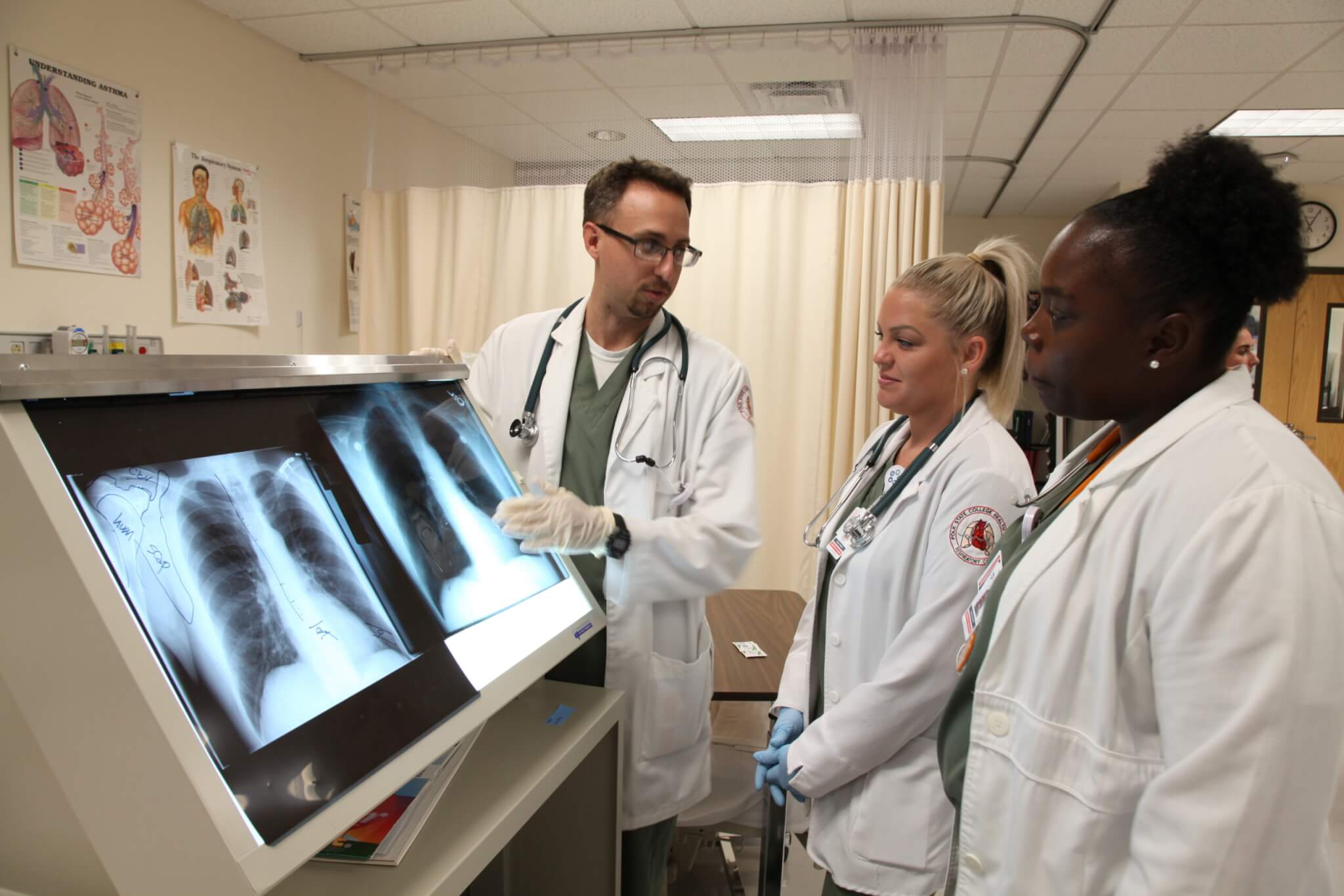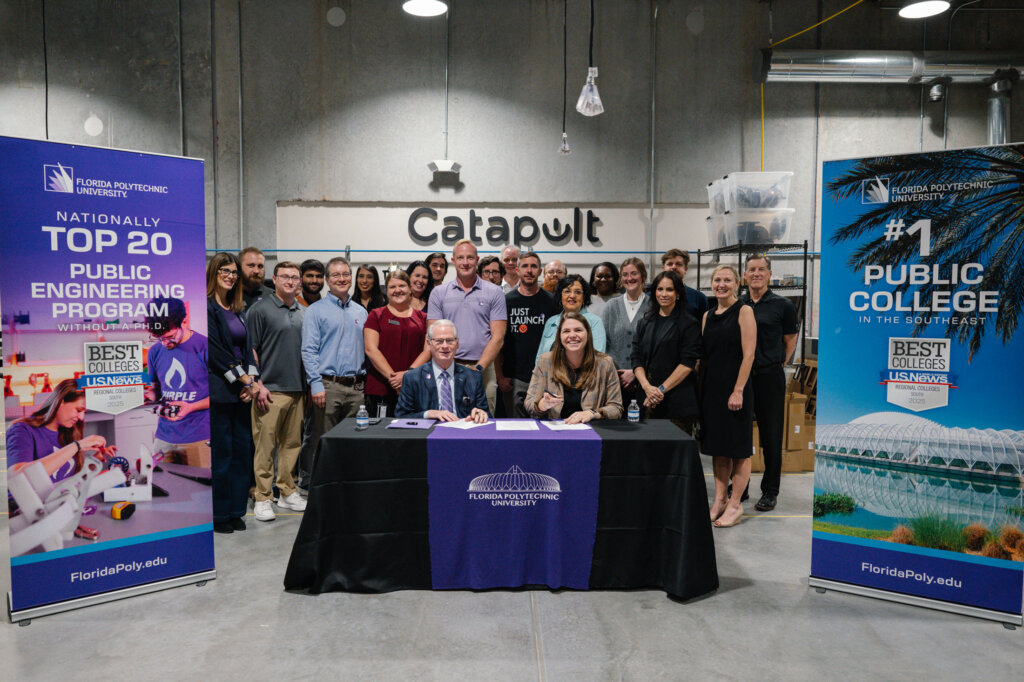Polk State College Respiratory Therapist Program
With demand for Respiratory Therapists growing, Polk State College is being recognized for excellence in its respiratory therapy program, which graduates students who often stay in Polk County to work.
Respiratory therapists may be the unsung heroes in healthcare facilities, working with doctors and nurses to provide oxygen and breathing treatments, intubate patients, manage ventilators, administer drugs to the lungs and perform diagnostic testing.
“Polk State College is proud of its highly esteemed Respiratory Care Program, which continues to provide Polk County with a strong pipeline of highly skilled healthcare professionals,” said Polk State President Angela Garcia Falconetti. “The COVID-19 pandemic brought the field of respiratory care to the forefront. The need for respiratory therapists continues to grow, and Polk State remains dedicated to providing the education and training to fulfill workforce needs.”
At the helm of the program is Shana Kent-Smith, who has grown the program by 50% in her five years there, building it based on the success of the program, Polk State’s reputation and the pandemic, she said.
A Growing Field
Respiratory therapists (RTs) are in demand: From 2021 to 2031, the number of respiratory therapists is expected to grow by 14% in the U.S., according to the U.S. Bureau of Labor Statistics.
“With the high demand for RTs, graduates of our program often begin their new jobs immediately,” Kent-Smith said. “In addition to the impact that RTs have on lives, they have the opportunity to work in a team environment with flexible hours and a wide range of duties and responsibilities. RT careers also offer the ability to relocate, if desired, and a median salary of about $62,000, which is higher than the national average.”
More people are learning about the field, she said. “This career plays a huge role at the bedside along with other members of the health-care team. Respiratory therapy is a very rewarding career. I would encourage anyone who wants to work in healthcare to consider becoming a respiratory therapist.”
Kent-Smith entered the field to help her mother, who suffered from uncontrolled asthma. “I applied to the Florida A&M University Cardiopulmonary Bachelor of Science program to learn more about chronic asthma and other respiratory impairments. Improving the quality of my mother’s life gave us joy and happiness, especially in her later years. I used the knowledge gained from the respiratory care program and educational techniques to change the lives of my mother, several patients, patients’ families and students. Education is the most powerful weapon you can use to change the world.”
Respiratory Therapist Program Gaining Attention
The program has recently been recognized with two key awards:
- Distinguished Registered Respiratory Therapist Credentialing Success Award, which recognizes programs that have at least three years of outcome data, are accredited through the Commission on Accreditation for Respiratory Care (CoARC), have at least a 90% Registered Respiratory Therapist (RRT) credentialing success rate, and meet or exceed CoARC thresholds for scores and retention. In 2022, Polk State graduates scored 100% on entry-level and advanced-level exams, exceeding the national average by 23% and 37%, respectively, Kent-Smith said.
- The Healthcare Education Commission’s Exemplary Practice Award by the Association of Florida Colleges. The program was nominated for the award and was one of four programs to present its best practices at a November 2022 conference.
Active Learning Environment
Patients who need RTs vary from infants to the elderly, Kent-Smith said. “RTs work with infants whose lungs are not fully developed, elderly people battling lung disease and everyone in between with respiratory diseases or disorders. This includes patients with asthma, bronchitis, COPD, pulmonary hypertension, croup and pneumonia just to name a few lung impairments. Each patient population has its own specialty that the RT is trained for.”
Students used to practice their care on manikins, where instructors verbalized a patient’s response, Kent-Smith said. Now, they use new state-of-the-art equipment, including two GlideScopes for intubation simulation; adult, pediatric and neonatal simulators; and specialty beds that it purchased with Higher Education Emergency Relief Fund money.
“With these equipment upgrades, we can provide a real-time patient response to students’ choice of respiratory care treatment,” she said. “Now, the instructor can manipulate the simulator, and the student can see the patient’s response to the student’s choice of respiratory care and technique of procedure. This not only mimics the clinical setting but improves decision-making and critical-thinking skills in the lab before going to the clinical setting. The new equipment will allow our students more effective hands-on experience in the lab and make our exemplary program better.”
Through the years, local hospitals have also donated supplies to the program, Kent-Smith said. BayCare Winter Haven Hospital, Lakeland Regional Hospital and BayCare Bartow Regional Medical Center are three of the program’s oldest partners. “We are proud to partner with health-care facilities from across the region, including AdventHealth Heart of Florida, AdventHealth Lake Wales, AdventHealth Celebration, Orlando Health Ocoee, HCA Poinciana Medical Center, and our new partners, AdventHealth Kissimmee and Watson Clinic Pulmonary Function Lab.”
Staying in Polk County
The program has a 100% employment rate, Kent-Smith said, and many students stay in Polk County, although the percentage varies from class to class.
“A lot of our students are local, so they do end up staying within our county and feeding into our local hospitals. Most of our clinical facilities are within our county, which gives our students quite a few options to choose from when deciding where to work. We always enjoy it when our graduates stay local and give back to our community.
In 2023 and 2021, 100% of graduates remained in Polk. In 2022 and 2020, 46% and 55%, respectively, remained in Polk County while the rest accepted jobs near their homes in Orange, Highlands and Hillsborough Counties.
Respiratory therapists “can really make a difference and help save lives,” Kent-Smith said.
The Next Step
RTs who want to attain a higher level of education can earn a Bachelor of Science degree, then become a respiratory department clinical educator, Kent-Smith said. In a hospital, a registered respiratory therapist (RRT) can advance to a lead respiratory therapist or department supervisor.
“Most respiratory care hospital department directors have a master’s degree,” she said. “In business, those with a B.S. can leave the hospital, move to home care, and establish their own equipment company or clinical services. In the corporate world, advancement includes product or marketing specialists. After earning a M.S., an RRT can advance to the Executive Fellow program, which provides in-depth training for hospital leadership or work in the CDC and public health.”
More information about Polk State Respiratory Care and access to the application between April 1 and May 30 are available at www.polk.edu/respiratory-care.



